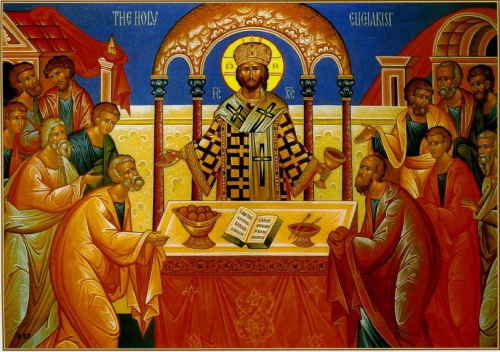
From the Palamas Institute for Orthodox Christian Pastoral Studies.
By Fr. Gregory Jensen
If I ask myself this question at all, “What is salvation for?” I’m likely to answer that my salvation is for me; so that I can be saved from sin and enter the Kingdom of God. But this is only a partial answer.
In his defense of the Christian faith, St Justin Martyr (Apology, 66 & 67) makes a couple of points that are worth reflecting on as we try to answer the question.
Let’s begin, with Justin’s outline of the basic structure of how the Church celebrated—in fact still celebrates—the Eucharist.
Interestingly, he doesn’t start with telling us what the Eucharist is but the conditions for participating in it:
And this food is called among us ???a??st?a [the Eucharist], of which no one is allowed to partake but the man who believes that the things which we teach are true, and who has been washed with the washing that is for the remission of sins, and unto regeneration, and who is so living as Christ has enjoined.
Sharing in the Eucharist requires that we believe what the Church teaches, that we have been baptized “for the remission of sins” and finally live as disciples of Jesus Christ (“lives in accordance with the principles given us by Christ”). So, we need three things:
- Obedience to the teaching of the Church
- Repentance and baptism
- A life of intentional discipleship (“so living as Christ has enjoined”)
It only when all three of these are fulfilled Justin says, that we may “allowed to partake” ofthe Eucharist And we do this so that we can be joined to Christ by “prayer of His word” making “our blood and flesh … transmutation[ed]” into “the flesh and blood of that Jesus who was made flesh.”
So, what is salvation for? Well it is for our transformation into another Jesus; we are saved so that we can become another Christ (alter Christus) not just metaphorically but actually by sharing in the divine nature (2 Peter 1:4).
Though this process of becoming another Christ is personal, It isn’t individualistic; it isn’t up to me alone to decide what it does or doesn’t mean to be a Christian. This is why, to return to Justin’s apology, when we gather to celebrate the Eucharist we begin by listening to the Scriptures:
[O]n the day called Sunday, all who live in cities or in the country gather together to one place, and the memoirs of the apostles or the writings of the prophets are read, as long as time permits; then, when the reader has ceased, the president verbally instructs, and exhorts to the imitation of these good things. Then we all rise together and pray.
It’s only after reflecting on the Scriptures and our common prayer to God that, Justin says, the eucharist is “distribution to each, and a participation of that over which thanks have been given, and to those who are absent a portion is sent by the deacons”
So our salvation is not for our becoming another Christ. It is also for becoming a member of the Church. My salvation then is not simply “for me” but “for you” as well.
If, as often happens, we stop here, we risk missing the fullness of what our salvation is for.
The late Fr Alexander Schmemann has pointed out that Orthodox parishes are self-absorbed and self-important. We do things, he says, for the Church that we would condemn if done for the individual.
Hard as it is to say it, it is often the case that parishes really only care for themselves. The individual Christian and the local parish are important but they aren’t, really, the point of our salvation.
God doesn’t save me simply to transform me into the likeness of His Son.
And while God calls me to live as a member of the Body of Christ, this isn’t really what salvation is for.
So what is salvation for? Back to St Justin:
And they who are well to do, and willing, give what each thinks fit; and what is collected is deposited with the president, who succours the orphans and widows and those who, through sickness or any other cause, are in want, and those who are in bonds and the strangers sojourning among us, and in a word takes care of all who are in need.
Compare this to what we usually hear about stewardship. We give what our heart tells us not to keep the church open but to care for those “in distress.”
What this means is that salvation is for “the life of the world.”
So now the question is, how do we put our salvation into practice?

This essay first appeared on the Palamas Institute for Orthodox Christian Pastoral Studies website and is reprinted with permission.

